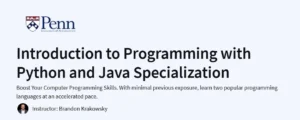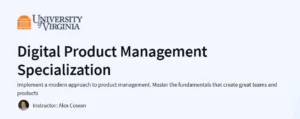What will you learn in Functions, Methods, and Interfaces in Go Course
Use functions in Go to organize and manipulate data.
Explore advanced function types, including higher-order and deferred functions.
Discover Go’s object-oriented features like classes and pointer receivers.
Master interfaces and polymorphism for clean, abstract code.
Create your own Go applications hands-on across four modules.
Program Overview
Module 1: Functions and Organization
Duration: ~3 hours
Topics: Introduces Go functions, parameters/return values, call by value/reference, arrays and slices, and function-writing guidelines.
Hands-on: Watch 7 videos + 8 readings; complete a quiz and a peer-reviewed assignment (Bubble Sort program).
Module 2: Function Types
Duration: ~2 hours
Topics: Covers first-class functions, returning functions, and variadic/deferred functions.
Hands-on: Watch 3 videos + 3 readings; complete a quiz and peer-reviewed assignment (practical physics routine).
Module 3: Object Orientation in Go
Duration: ~1 hour
Topics: Explores object orientation in Go—classes, encapsulation, pointer receivers.
Hands-on: Watch 6 videos + 6 readings; complete a quiz and peer-reviewed assignment illustrating OOP patterns.
Module 4: Interfaces for Abstraction
Duration: ~3 hours
Topics: Introduces interfaces and polymorphism, enabling abstraction in Go programs.
Hands-on: Engage with videos/readings and build a Go routine using interfaces and class instances.
Get certificate
Job Outlook
Relevant for Backend Developers, Go Programmers, Software Engineers, and System Architects.
Ideal in sectors like cloud services, scalable systems, and concurrent applications.
Gains you key skills in high-performance Go programming that’s in demand across tech industries.
Compensation for Go developers typically ranges from ₹10–20 LPA in India, or $70,000–$120,000 USD globally.
Specification: Functions, Methods, and Interfaces in Go Course
|
FAQs
- Intermediate-level course; basic Go knowledge recommended.
- Introduces functions, methods, and interfaces for structured code.
- Hands-on projects reinforce real-world Go programming skills.
- Covers function types, object orientation, and polymorphism.
- Ideal for learners aiming to write scalable, production-ready Go applications.
- Covers classes, encapsulation, and pointer receivers.
- Demonstrates how to structure scalable Go programs.
- Explains polymorphism and interface implementation.
- Provides practical coding exercises with peer-reviewed assignments.
- Prepares learners to develop maintainable, modular Go applications.
- Focuses on writing efficient, scalable Go code.
- Ideal for backend development, cloud services, and concurrent applications.
- Provides hands-on coding experience for real-world scenarios.
- Supports roles like Go Programmer, Backend Developer, or Software Engineer.
- Enhances employability in high-demand Go programming jobs.
- Total course duration: approximately 9 hours.
- Includes 4 modules: functions, advanced functions, object orientation, interfaces.
- Hands-on coding exercises and peer-reviewed assignments included.
- Self-paced format allows flexible scheduling.
- Ideal for learners seeking practical experience in a short time.
- Master higher-order, variadic, and deferred functions.
- Apply interfaces and polymorphism for clean code abstraction.
- Build scalable Go applications using structured OOP principles.
- Reinforces learning with real coding exercises.
- Skills are valuable in cloud computing, concurrent systems, and software engineering roles.





